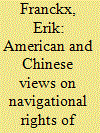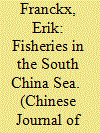| Srl | Item |
| 1 |
ID:
102585


|
|
|
|
|
| Publication |
2011.
|
| Summary/Abstract |
Opposing American and Chinese views on navigational rights of warships in the exclusive economic zone (EEZ) reached a climax in 2009 with a number of incidents. Developments in 2010 indicate that the general climate between the two States in the South China Sea has not improved. By focusing on navigational rights of warships in the EEZ as well as in the territorial sea, the present contribution highlights some salient features of the relevant ocean policies of both States, some of which seem hard to square with the United Nations Convention on the Law of the Sea. After having noted that these opposing positions of China and the United States concerning navigational rights of warships are hard to reconcile at present, the article looks for possible solutions as to the future.
|
|
|
|
|
|
|
|
|
|
|
|
|
|
|
|
| 2 |
ID:
116552


|
|
|
|
|
| Publication |
2012.
|
| Summary/Abstract |
The present paper intends to have a look at fisheries in the South China Sea in order to find out whether this particular issue is a problem solver or rather a problem creator in this region characterized by tense inter-State relationships at present. In this part of the world's ocean, dominated by maritime features such as the Paracels and the Spratleys, i.e. shallow areas, sometimes drying only at low tide, and sometimes at high tide as well, fish is a plentiful resource relied upon by many fishermen of the surrounding countries as a source of income. If we take Europe as an example, fisheries seem to have the dual capability to either trigger disputes between States, resulting sometimes in outright fish wars, or to provide a means of furthering integration between States, such as has been accomplished by the European Common Fisheries Policy. In the South China Sea a similar duality can be witnessed. At times, fishermen have dramatically influenced the relations between certain States to the point of suddenly straining diplomatic relations totally disproportionately to the event which had triggered a particular incident. But fisheries are also used as a vehicle for trying to further co-operation on both bilateral and regional levels. Indeed, very often fisheries are seen as a more "neutral" area able to stimulate co-operation more easily than, for instance, co-operation in the military field or on sovereignty-related issues. This paper will conclude by determining whether Article 123 of the 1982 United Nations Convention on the Law of the Sea adds any legal obligation to the riparian States of a semi-enclosed sea in this respect.
|
|
|
|
|
|
|
|
|
|
|
|
|
|
|
|